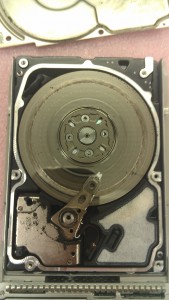At Datarecovery.com, we operate four full-service laboratories to maintain the industry’s highest success rates for RAID arrays, hard drives, solid-state drives, and various other data storage technologies. We routinely recover cases that have been dismissed as “unrecoverable” by other firms, and we continue to invest heavily in research and development.
Of course, not every case is recoverable — and our clients often ask us whether data recovery is impossible in specific scenarios.
The quick answer: We need to evaluate the device. No data recovery provider can accurately determine the chances of recovery without an in-laboratory analysis; even in extreme circumstances, the data may be recoverable (for example, fire- and flood-damaged hard drives are frequently treatable with appropriate equipment).
But certain data recovery scenarios have a much, much lower chance of success. Below, we’ll discuss a few of those situations.
Datarecovery.com provides free media evaluations, and we support all of our services with a no data, no charge guarantee: If we’re not able to restore your files, you don’t pay for the attempt.
To get started, call 1-800-237-4200 or submit a case online.
1. Overwritten Data (Under Certain Circumstances)
If you delete a file or format a hard drive — and take no other action — there’s a good chance that your data is still recoverable. However, when data is overwritten, the chances of recovery plummet.
The Department of Defense (DoD) and other organizations recommend overwriting data several times to ensure full sanitization; realistically, however, a single overwrite is enough to prevent a complete recovery from a hard drive. On solid-state drives and flash drives, the prognosis is even worse.
The good news: If you’re not intentionally destroying your data with data sanitization software, the chances of a full overwrite are quite low. However, the device will need to be cloned (copied) to maximize the chances of recovery.
Read more: Do “File Shredder” Programs Really Work?
2. Hard Drive Platter Damage
Hard drives store data on platters, discs coated in a thin magnetic material. If the material is damaged, the data is destroyed — but modern hard drives have a number of technical features to prevent this from happening.
Of course, read/write head crashes still happen, and they can be severe. Here’s a case we received with significant platter damage:

These badly scored hard drive platters were damaged by a failing head assembly.
This typically occurs when the user allows the hard drive to run following a physical failure. Platter damage can occur in seconds, but severe rotational scoring is almost always partially user error.
If your hard drive makes unusual noises or shows any signs of physical damage, turn it off immediately. Do not operate the drive. Get a professional assessment from a qualified data recovery firm.
Read more: What Does Hard Drive Platter Damage Look Like?
3. Certain Ransomware Attacks
Ransomware encrypts data, preventing the user from accessing files unless the ransom is paid.
Paying a ransom may be illegal, and it’s often ineffective: Decryption tools supplied by bad actors aren’t always helpful, and some may cause extensive corruption.
Fortunately, many ransomware variants use outdated encryption techniques, and data recovery is often possible. Even if that’s not the case, ransomware specialists can identify the vector of attack, form a disaster recovery strategy, and provide other services that reduce the fallout for victims.
Related: Are Ransomware Decryption Tools Safe?
All data loss scenarios must be evaluated by a professional.
Very few cases fall under one of the scenarios described above. If a hard drive has platter damage, data recovery technicians may be able to read other parts of the drive to restore some data — and if data is accidentally deleted, an experienced technician can usually restore the files.
Ultimately, every situation is different. While some scenarios have a relatively low chance of success, engineers must assess all of the factors in each case and inspect the storage media to create a recovery plan.
If you’ve lost important data, we’re here to help. Schedule a free evaluation online or call 1-800-237-4200 to get started.




